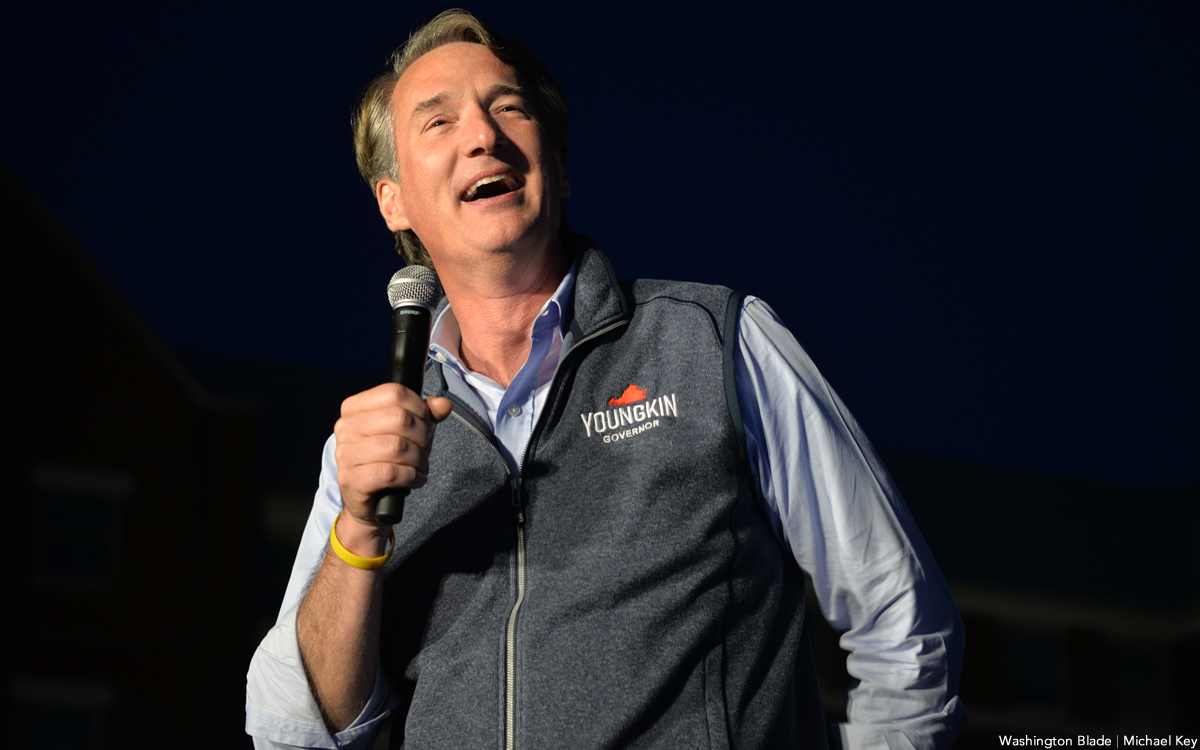Virginia
Va. lawmakers leave LGBTQ students in precarious position
‘Politicizing and censoring our nation’s history’

Legislation proposed during the Virginia General Assembly’s 60-day session has angered LGBTQ activists in the state as they say it will bar self-expression in schools and uphold troublesome relics of past homophobic legislation.
A bill giving parents the power to review sexually explicit content before it is taught in the classroom was passed by both chambers of the General Assembly and is likely to be signed by Republican Gov. Glenn Youngkin.
Officially listed as SB 656, it also requires educators to provide alternatives to instructional material and related academic activities that include sexually explicit content.
The bill, spearheaded by Sen. Siobhan Dunnavant, R-Henrico, is in line with Youngkin’s 2021 gubernatorial campaign during which he promised to give parents a more involved role in determining their children’s curriculum.
“This administration has made it a priority to enact classroom censorship, politicizing and censoring our nation’s history and the lived experience of marginalized communities,” said Breanna Diaz, policy and advocacy counsel at American Civil Liberties Union of Virginia. ACLU of Virginia is a private non-profit organization that advocates for LGBTQ individuals in the commonwealth through public education, litigation, and advocacy.
“[This bill], arguably, is going to erase LGBTQ history and LGBTQ figures and movement leaders from the classroom,” she said.
Although lawmakers proposed the bill with one of the goals being to facilitate curricula lucidity between schools and parents, various local school divisions already had systems in place that kept parents aware of any controversial content that would be discussed in classes.
“Parents always get copies of the reading lists that their children are expected to go through,” said Sen. Barbara Favola, D-Arlington, in a February interview with the Virginia Mercury.
The goal of the bill, activists say, is to remove literature from the classroom that explicitly discusses race and sexuality and thwarts students’ and teachers’ ability to express their identities.
“SB 656 is duplicative and redundant and adds an additional layer of labor on educators to avoid confusion and possibly getting in trouble for doing their job and teaching everything,” said Diaz. “They might have to develop multiple curricula, or just outright remove entire books, lessons, and studies.”
The General Assembly also struck down legislation that would have given voters a chance to decide on whether to overturn a now-defunct provision in the commonwealth that bans same-sex marriage.
The Marshall-Newman Amendment — approved in 2006 — defines marriage as between a man and a woman, and anti-LGBTQ groups argued that repealing the bill would help legalize polygamy and child marriage in the state.
“It is defunct, discriminatory, bigoted, and it has no place in our constitution,” said Narissa Rahaman, executive director of Equality Virginia. “Marriage equality is the law of the land,” she said.
Gov. Youngkin has opposed marriage equality. He, however, has also stressed that it is “legally acceptable” in Virginia and he would “support that” as governor, the Washington Blade reported in January.
Activists in other states, such as Texas, are also pushing to amend parts of the constitutions that clutch onto homophobic relics of history in legislation.
These efforts have been in vain as the Texas Legislature failed to repeal a homophobic law that has been unenforceable since 2003, The Guardian reported in 2019.
“That bad example in Texas is what we’re seeing play out in Virginia,” said Diaz.
Virginia
Freddie’s to hold ‘Love Fest’ Drag Story Hour after bomb threat
Arlington gay bar receives outpouring of support from community

Freddie’s Beach Bar and Restaurant, the Arlington, Va. LGBTQ establishment, has announced it is hosting a “Love Fest” celebration on Saturday, May 4 that will include a Drag Queen Story Hour brunch in response to a bomb threat that interrupted the first Drag Story Hour event it hosted four weeks earlier.
“Help us stop the hate,” a flier announcing the May 4 Love Fest event says. “Join us for our next story time brunch, dressed in your favorite Rainbow/Hippie outfit,” the flier says. “Carry your homemade signs of support.”
Freddie Lutz, Freddie’s Beach Bar owner, said a portion of the proceeds of the event will be donated to local LGBTQ charities.
Lutz has reported that separate email messages with a bomb threat were sent to the Freddie’s in the Crystal City section of Arlington, the Freddie’s Beach Bar in Rehoboth Beach, Del., and to him personally with a threat targeting his and his husband’s house located near the Freddie’s in Crystal City.
He said the first threat arrived about an hour before the April 6 Drag Story Hour was scheduled to begin, with drag queen Tara Hoot scheduled to read children’s stories to what Lutz said was a large turnout of kids with their parents and family members. After asking all patrons to exit the bar into its rear outdoor seating area and parking lot, Arlington police conducted a thorough search of the premises with a bomb sniffing dog and found no trace of a bomb.
All customers, including parents and their children, were invited back inside and the show took place as planned, with drag performer Hoot describing the event as a display of “fun and love and joy.”
Lutz has said the May 4 Love Fest event, which is scheduled to begin at 11 a.m., is intended to show the community and those responsible for bomb threats at many of the past Drag Story Hour events, that these events enjoy strong community support.
“They’re trying to scare us and intimidate us, and I just don’t think as a community we can allow that to happen,” he told WUSA 9 TV News. “It emboldens me to just carry on,” he said.
He told the Washington Blade he and his staff are honored that they have received an outpouring of support from community organizations, other nearby businesses, and government officials.
The Arlington County Board, which is the governing body of the county, voted unanimously on April 9 to approve a statement supporting Freddie’s Beach Bar and the LGBTQ community in response to the bomb threat incident.
“Arlington County and the County board unequivocally support the LGBTQ+ community,” the statement says. “Arlington County Police Department’s swift response ensured the safety of patrons and staff, and the fortitude of Freddie and drag queen Tara Hoot allowed the show to go on,” the statement continues.
“With protests, threats, and violence targeting the LGBTQ+ community – and drag shows in particular – on the rise across the country, expressions of hatred and bigotry have absolutely no place in our community, and the Arlington County Board condemns these threats of violence and attempted intimidation of our community,” it says.
Virginia
Norfolk transgender resource center vandalized
Anti-trans graffiti spraypainted onto Southeastern Transgender Resource Center’s windows

The Norfolk Police Department is investigating the vandalism of a transgender resource center’s building.
Tarena Williams, founder of the Southeastern Transgender Resource Center, told WAVY that someone spraypainted anti-trans graffiti on the windows of her organization’s offices on Sunday or Monday morning. Williams told the Hampton Roads television station that seeing the messages was like “walking into hell.”
“I opened up STRC, even the Lamina House,” she told WAVY. “I opened up that to get away from those types of words. This is a place you can come to get away from that, but to see that sprayed over the window. It’s kind of like you are walking into hell. … To be honest, I was like in shock.”
Authorities are investigating the vandalism.
Virginia
Bomb threat interrupts Drag Story Hour event at Arlington gay bar
Event resumed after police, bomb sniffing dog search of Freddie’s Beach Bar

A Drag Story Hour event hosted by the Arlington, Va. gay bar and restaurant Freddie’s Beach Bar was interrupted by a bomb threat sent by email on Saturday, April 6, requiring parents and their children attending the event to exit the bar into its rear outdoor seating area and parking lot until police and a bomb sniffing dog searched the premises and found no trace of a bomb.
Freddie Lutz, owner of Freddie’s Beach Bar, located in the Crystal City section of South Arlington, said the threatening email from an unidentified sender came during the first time he has hosted a Drag Story Hour event, which includes a drag performer reading children’s stories to children accompanied by their parents.
“We had a lot of neighborhood families with kids and babies and one grandmother in there,” Lutz told the Washington Blade. “It was a great turnout, and we had to push them all out to the back parking lot,” he said. “And they waited, which I thanked them for, until the coast was clear. And then they came back in.”
Lutz said that two protesters opposed to the drag event showed up outside Freddie’s on Saturday, at the time of the Drag Story Hour event. He said drag performer Tara Hoot, who conducted the Drag Story Hour at Freddie’s, told him before the event started that some of her previous Drag Story Hour events have been targeted with bomb threats and protesters.
“So, we were kind of prepared or I guess you could say psychologically prepared for it,” Lutz said. “And sure enough, we got an email threatening the bar and also me personally at my residence, which was a little unsettling,” he said, adding that nothing was found at his nearby South Arlington house.
In response to an inquiry from the Blade, Arlington police released a brief statement about the incident.
‘At approximately 11:15 a.m. on April 6, police were dispatched to the report of a bomb threat emailed to a business,” the statement says. “Responding officers made contact with the occupants, conducted a sweep of the business and found no evidence of criminal activity located at the restaurant during the sweep,” it says. “The investigation into the threat is ongoing.”
Hoot, who has been conducting Drag Story Hour events in the D.C. area for more than a year, said as many as eight of her past events have been targeted by hostile protesters or bomb threats, although no bombs have ever been found at the locations where the events have taken place.
Hoot said like protesters targeting her previous events, the two protesters at the Freddie’s event, a man and a woman, cited their religious believes as their reason for opposing the Drag Story Hour event.
“They were spewing religious hate,” Hoot told the Blade. “They were trying to shame parents for bringing their kids.”
Hoot said she includes in the performances songs of interest to children and reads from children’s books such as the Very Hungry Caterpillar, a book that talks about bravery and other positive themes. “And then I give them bubbles and rainbow ribbons and we all color together,” she said. “It’s just fun and love and joy.”
Started in San Francisco in 2015 by an organization called Drag Story Hour, the story hour events have taken place across the country in libraires, bookstores, and venues such as restaurants and bars.
“In spaces like this, kids are able to see people who defy rigid gender restrictions and imagine a world where everyone can be their authentic selves,” the organization says on its website.
-

 State Department2 days ago
State Department2 days agoState Department releases annual human rights report
-

 Maryland4 days ago
Maryland4 days agoJoe Vogel campaign holds ‘Big Gay Canvass Kickoff’
-

 Politics3 days ago
Politics3 days agoSmithsonian staff concerned about future of LGBTQ programming amid GOP scrutiny
-

 The White House1 day ago
The White House1 day agoWhite House debuts action plan targeting pollutants in drinking water









